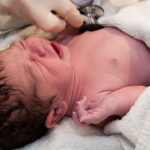NICU
NICU stands for Newborn Intensive Care Unit. This is a nursery in a hospital that provides around-the-clock care to sick or premature babies. It has health care providers who have special training and equipment to give your baby the best possible care.

A neonatal intensive care unit, also known as an intensive care nursery, is an intensive care unit specializing in the care of ill or premature newborn infants. Neonatal refers to the first 28 days of life. Neonatal care, as known as specialized nurseries or intensive care, has been around since the 1960s.
NICU is typically directed by one or more neonatologists and staffed by nurses, nurse practitioners, pharmacists, physician assistants, resident physicians, respiratory therapists, and dietitians. Many other ancillary disciplines and specialists are available at larger units.
Which babies need special care?
Most babies admitted to the NICU are preterm (born before 37 weeks of pregnancy), have low birth weight (less than 5.5 pounds), or have a health condition that needs special care. In the U.S., nearly half a million babies are born preterm. Many of these babies also have low birth weights. Twins, triplets, and other multiples often are admitted to the NICU. This is because they tend to be born earlier and smaller than single birth babies. Babies with health conditions such as breathing trouble, heart problems, infections, or birth defects are also cared for in the NICU.
5.5 pounds), or have a health condition that needs special care. In the U.S., nearly half a million babies are born preterm. Many of these babies also have low birth weights. Twins, triplets, and other multiples often are admitted to the NICU. This is because they tend to be born earlier and smaller than single birth babies. Babies with health conditions such as breathing trouble, heart problems, infections, or birth defects are also cared for in the NICU.
Below are some factors that can place a baby at high risk and increase the chances of being admitted to the NICU. But each baby must be assessed to see if he or she needs the NICU. High-risk factors include the below.
Maternal factors include:
-
Being younger than age 16 or older than age 40
-
Drug or alcohol use
-
Diabetes
-
High blood pressure (hypertension)
-
Bleeding
-
Sexually transmitted diseases
-
Multiple pregnancy (twins, triplets, or more)
-
Too little or too much amniotic fluid
-
Premature rupture of membranes (also called the amniotic sac or bag of waters)
Delivery factors include:
-
Changes in a baby’s organ systems due to lack of oxygen (fetal distress or birth asphyxia)
-
Buttocks delivered first (breech birth) or other abnormal position
-
The baby’s first stool (meconium) passed during pregnancy into the amniotic fluid
-
Umbilical cord wrapped around the baby’s neck (nuchal cord)
-
Forceps or cesarean delivery
Baby factors include:
-
Baby born at gestational age of less than 37 weeks or more than 42 weeks
-
Birth weight less than 5 pounds, 8 ounces (2,500 grams) or over 8 pounds, 13 ounces (4,000 grams)
-
Small for gestational age
-
Medicine or resuscitation in the delivery room
-
Birth defects
-
Respiratory distress including rapid breathing, grunting, or stopping breathing (apnea)
-
Infection such as herpes, group B streptococcus, chlamydia
-
Seizures
-
Low blood sugar (hypoglycemia)
-
Need for extra oxygen or monitoring, IV (intravenous) therapy, or medicines
-
Need for special treatment or procedures such as a blood transfusion
